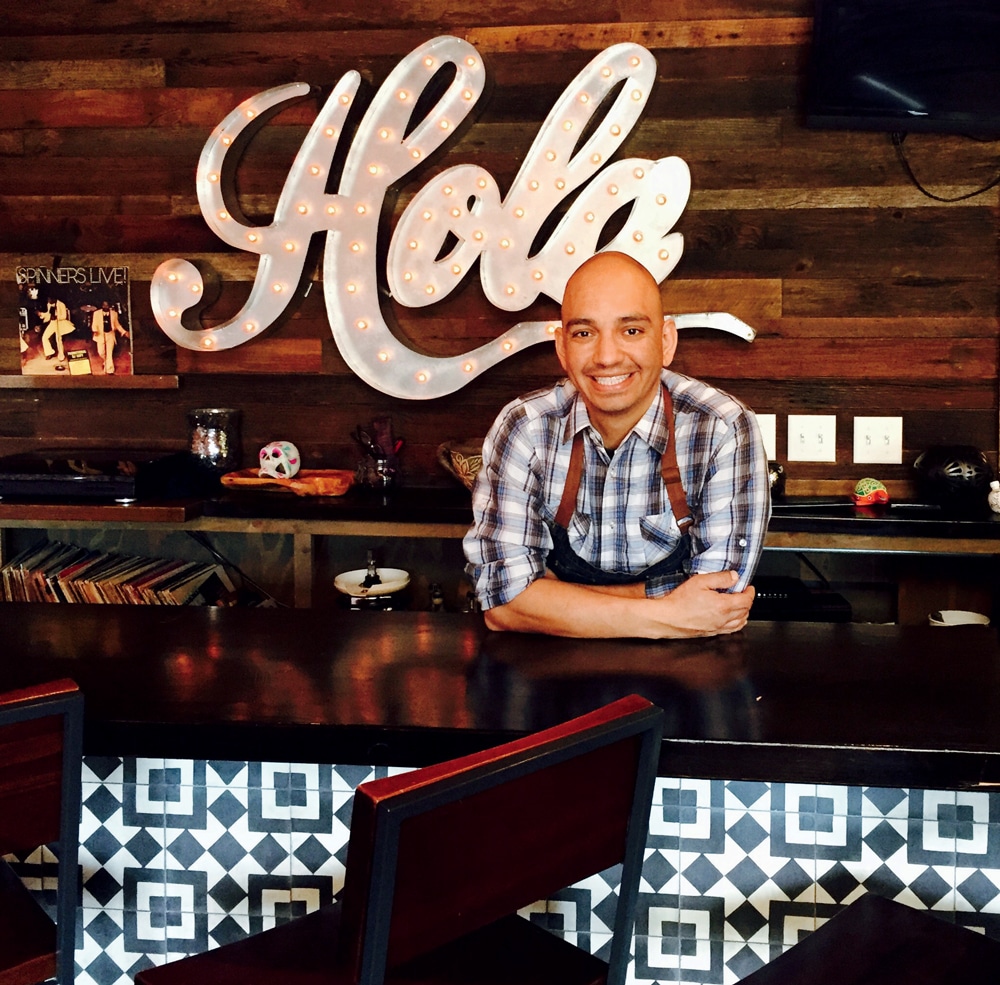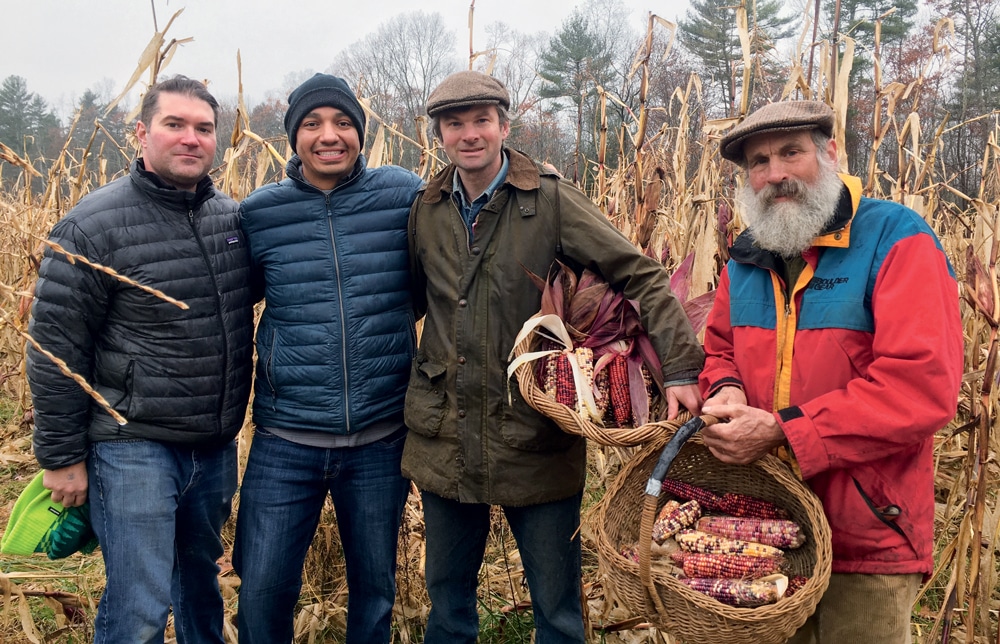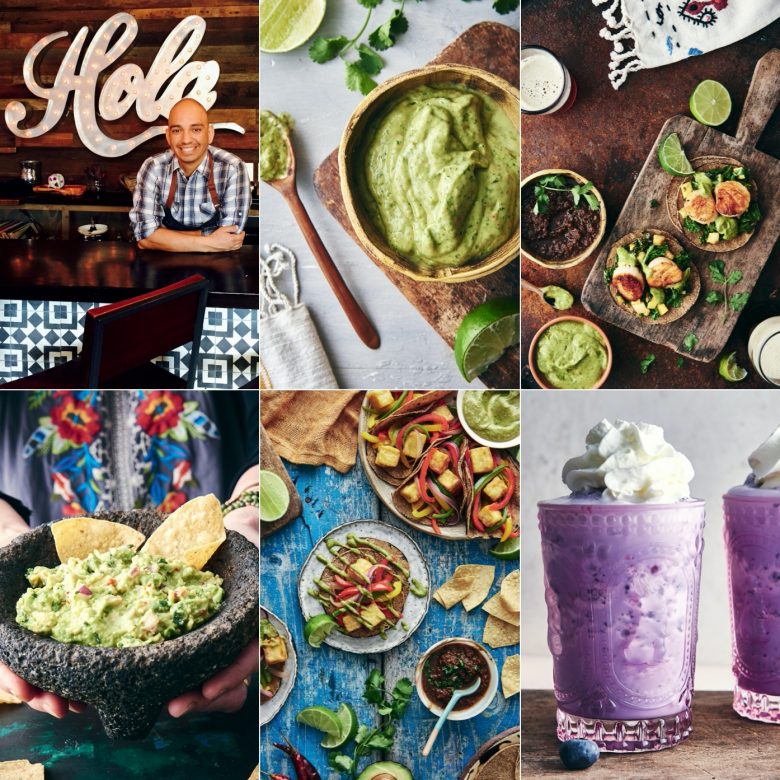La Vida Local | Vida Cantina in Portsmouth, New Hampshire
In a New England cornfield, acclaimed chef David Vargas of Vida Cantina in Portsmouth, New Hampshire, found a way to connect with his roots.

Vargas behind the bar at Vida Cantina in Portsmouth.
Photo Credit : courtesy of Vida CantinaThis is a chef’s story, about a California native who chose New England as his home. But it’s also a story about corn, our nation’s founding food. Without it, there might not have even been a nation. In 1620, after two months at sea and with food supplies running low, a band of Pilgrims raided a cache of dried flint corn buried by members of the local Nauset tribe, who had departed for their winter hunting grounds. The Pilgrims reportedly found “some yellow, and some red, and others mixed with blue, which was a very goodly sight,” and helped themselves to “three or four bushels” (they claimed to have later compensated the Nausets for the corn).
In time, and with help from their indigenous neighbors, the Pilgrims learned to adapt their wheat-based recipes for the “Indian meal” they could reliably grow. One such dish was a thin pancake made from cornmeal and water, the precursor to the Rhode Island johnnycake. “With a spoonfull of this meale and a spoonfull of water from the Brooke, have I made many a good dinner and supper,” wrote Roger Williams, the Puritan minister who cofounded the Colony of Rhode Island in 1636. In appearance and flavor, this simple pancake resembled a tortilla.
Our story now jumps more than three centuries ahead and 3,000 miles away, to the Southern California city of Santa Ana, where David Vargas grew up in and around the kitchen of his family’s taqueria. Good Mexican food was everywhere, with corn tortillas a staple. But when he embarked on a career as a chef, Vargas turned his sights away from his home cuisine and toward the French and California styles that would land him jobs at Michelin-starred restaurants such as Cyrus, in Sonoma County.

Photo Credit : courtesy of Vida Cantina
By 2010, he and his wife, Erika, a farmer and New Hampshire native, had two children, and living on a chef’s income in wine country was proving unsustainable. So, they headed east, settling in Kittery, Maine, in a house next door to Erika’s grandmother. They found a thriving restaurant scene, but Mexican fare was mostly “yellow-cheese-and-black-olive-style places,” Vargas says. “Which is fine. I like it too. But I knew by then that I was very interested in getting back to my roots. I wanted to do an elevated style of Mexican cooking.”
In 2014, he took over as chef-owner of Vida Cantina, a restaurant located in a former Friendly’s building on the south side of Portsmouth, New Hampshire. A local design firm had imagined the space in a bold Mexican pop art style, but the food was still old-school. Vargas began reworking the menu. He also started reaching out to local leaders in the sustainable food movement.
At the same time, he was familiarizing himself with all the New England classics, sampling his in-laws’ food and buying old regional cookbooks from thrift shops. “I’d never had boiled dinner or baked haddock or brown bread,” he says. “Within three months, we’d had all of it.”
He folded New England touchstones like baked haddock into the Vida Cantina menu, “but I started to use tortillas instead of Ritz crackers for the topping,” he says, “and put tequila and mescal in the sauce.” He came up with his own, locally sourced version of the classic Friendly’s milkshake, the Fribble, which he served with churros. Still, tacos remained the most popular item on the menu. That was fine, but Vargas felt he could do better.
“I knew that if I wanted to have the best tacos in the area, we’d have to elevate our tortilla game,” Vargas says. He started the “easy way,” buying commercial masa harina, corn flour, and making 500 tortillas by hand each day. They were good, but still not good enough.“The next step was to make the masa ourselves,” he says. “We needed to fully revert to ancient ways.” That meant taking local field-dried corn, soaking it in an alkaline solution (a process called nixtamalization), and grinding it.
Photo Credit : Lauren Burdett
Through his work with the Heirloom Harvest project, a local nonprofit that promotes heritage foods by connecting farmers and chefs, Vargas met the Cox family, third-generation farmers who own Tuckaway Farm in nearby Lee, New Hampshire. They were already growing flint corn—the harder, starchier cousin of the sweet corn we eat in the summer—and Vargas began experimenting with different varieties. He ultimately landed a yellow, red, and purple variety called Autumn Explosion. “It had that rich corn smell and nutty flavor,” Vargas says. “It made beautiful blue tortillas. And the masa we made with it had better density.”
The tortillas were so good that Vargas saw a market beyond Vida Cantina. Thus, with the help of his friend, Dos Amigos Burritos cofounder Joel Harris, Vida Tortilla was born. Today it produces 15,000 tortillas per week in a small facility carved out of a former mill building in Dover, New Hampshire, selling them wholesale to restaurants and markets, and direct to consumers at farmers’ markets.
The goal is to sell the tortillas throughout the region, perhaps nationwide. A handful of other farms have already started growing corn to meet Vargas’s increased demand. And though customers have encouraged Vargas to open Vida Cantinas in other newly shuttered Friendly’s locations, he doesn’t want to own a restaurant chain. With just one cantina (and a nearby barbecue restaurant, called Ore Nell’s), he can maintain his high standards and work/life balance—so much so that he’s been named a James Beard semifinalist for Best Chef–Northeast two years in a row.
Now his future is rooted in corn. He marvels at its versatility and “the way it’s been so essential to New England and to my culture.” Sometimes you can travel quite far and still find yourself at home.
Note: At press time, Vida Cantina was serving a limited menu via curbside pickup and local delivery. Vida Tortilla continues to sell to several Seacoast-area retail outlets.

Photo Credit : Chef David Vargas: Courtesy // Food: Liz Neily | Styling by Liz Neily
Vida Cantina Recipes:
Vida Guacamole
Avocado-Cilantro Salsa (Salsa de Aguacate)
Scallop Tacos with Summer Vegetables
Vida Cantina’s Vegan Tofu Ranchero Tacos
Maine Blueberry “Fribble”
Amy Traverso
Amy Traverso is the senior food editor at Yankee magazine and co-host of the public television series Weekends with Yankee, a coproduction with WGBH. Previously, she was food editor at Boston magazine and an associate food editor at Sunset magazine. Her work has also been published in The Boston Globe, Saveur, and Travel & Leisure, and she has appeared on Hallmark Home & Family, The Martha Stewart Show, Throwdown with Bobby Flay, and Gordon Ramsay’s Kitchen Nightmares. Amy is the author of The Apple Lover’s Cookbook, which was a finalist for the Julia Child Award for best first-time author and won an IACP Cookbook Award in the “American” category.
More by Amy Traverso

